 The U.S. Justice Department announced today that it will be filing suit to block the central provisions of North Carolina's new, draconian restrictions on voting.
The U.S. Justice Department announced today that it will be filing suit to block the central provisions of North Carolina's new, draconian restrictions on voting.
The DoJ will also ask the federal courts to require preclearance for new election-related laws in the state.
The Tar Heel State's massive new, controversial restrictions on voting were passed by Republicans this Summer just after the U.S. Supreme Court gutted the heart of the Voting Rights Act in June. We've previously described the new measure as the nation's worst voter suppression law since the Jim Crow era.
The DoJ lawsuit is the latest element of U.S. Attorney General Eric Holder's vow this summer to use "every tool" at the DoJ's disposal to fight for voting rights after SCOTUS dismantled a key provision of the VRA that required jurisdictions with a long history of racial discrimination in election laws, such as North Carolina, to seek federal approval, or "preclearance" before new election related laws could be enforced.
The suit follows similar action by the DoJ in Texas, where new polling place Photo ID restrictions and Congressional redistricting --- both previously found by the DoJ and federal courts to be purposefully discriminatory in the Lone Star State --- are also being challenged as violations of the VRA and the U.S. Constitution. The federal suit in NC is the latest of several complaints filed against the state's massive new voting restrictions, all of them alleging, with no small amount of evidence in support, that the law is a racially motivated attempt to suppress minorities and other Democratic-leaning voters.
From the DoJ announcement today:
Note the important point in the above alleging that the NC law is not only discriminatory, it is also purposely so. That argument will be key to the DoJ's case that the new law is in violation of Section 2 of the Voting Rights Act, as well as its argument that the state should be "bailed in" to require preclearance, as per Section 3(c) of the Act...
The DoJ complaint [PDF] targets several provisions of NC's HB 589. "In particular," according to the DoJ announcement, "it cites: the elimination of the first week of early voting, which reduces the total number of days of early voting (from 17 days to 10 days); the elimination of same-day voter registration during the early voting period; the prohibition on counting certain provisional ballots; and the failure to provide adequate safeguards for voters who lack the limited types of acceptable photo identification cards that will be required in future elections."
"Based on the state's own data," the DoJ explains [emphasis added], "all four changes will have a discriminatory impact on minority voters, who disproportionately have relied on the first seven days of early voting, the same-day registration process and past practices regarding the counting of certain provisional ballots in order to participate in the elections process. In addition, the State Board of Elections released a report earlier this year showing that African-Americans disproportionately lacked photo identification cards issued by the state's Department of Motor Vehicles. Despite knowledge of this report, the legislature adopted a strict photo identification requirement that lacks the types of protections for voters without identification that are common in other states that require voter identification."
Acting Asst. AG Jocelyn Samuels also underscored the purposeful nature of NC's new law, noting that "North Carolina adopted these changes in a rushed process, despite evidence before the legislators that a number of these changes will harm minority voters."
In other words, NC Republicans knew that the law would put minority voters at a disadvantage, and they passed the law anyway. The law does not only have a discriminatory effect, they argue, it also has a discriminatory intent.
Citing the state's own statistics, the DoJ notes by way of example, that "In the November 2008 and November 2012 general elections, about 71 percent of all African Americans who cast ballots in North Carolina during those elections voted during the early voting period." And yet the new law slashes the state's early voting period, despite the lack of evidence of any voter fraud in the state thanks to early voting.
In his coverage today at The Nation, Ari Berman points out several more statistics to underscore the discriminatory nature of NC's new election law.
"African-Americans are 23 percent of registered voters in North Carolina, but made up 29 percent of early voters in 2012, 30 percent of those who cast out-of-precinct ballots, 34 percent of the 318,000 registered voters without state-issued ID and 41 percent of those who used same-day registration."
"In 2012," he writes, "2.5 million North Carolinians voted early, 152,000 used same-day voter registration, 138,000 voters lacked government-issued ID and 7,500 people cast an out-of-precinct provisional ballot." The four previsions being challenged by the DoJ alone, Berman explains, "will negatively affect nearly 3 million people who voted in 2012."
In recent years, North Carolina had become one of the more progressive Southern states in regard to its voting laws, including same-day registration that hadn't even been available in many of the most progressive states around the country. But a clue to understanding NC's sudden interest in restricting voting, after Republicans have taken over both the legislature and the governor's mansion as of the 2012 election, might be found in this part of the DoJ's complaint:
Well, that might explain it.
As to the U.S. Supreme Court's argument --- when they nullified the list of jurisdictions required to receive federal preclearance before enforcing new elections laws, thanks to their history of racial discrimination --- the notion that preclearance is no longer needed in such places is belied by the spate of states that enacted similar new voting restrictions almost immediately following the Court's decision. Many of those very same laws, such as the ones in Texas, had already been found discriminatory by the federal court and were denied preclearance under Section 5 of the Voting Rights Act.
With Section 5 effectively nullified, for now, Republican states have been enacting laws that would have never passed muster previously. Berman notes, for example, that the DoJ's complaint states that "From 1980 to 2013...the DOJ blocked 155 voting changes in North Carolina under Section 5 of the VRA."
It seems clear Section 5 was doing its job, and was very much needed in places like North Carolina, even before the passage of their draconian new voting law. With a dysfunctional Congress unlikely to pass new Section 4 standards determining which jurisdictions should require preclearance under Section 5 (despite nearly unanimous approval of a 25-year re-authorization of the VRA by both Republican-led chambers as recently as 2006, as proudly signed by George W. Bush), the use of Section 3(c) to bail jurisdictions in for preclearance requirements is key to the DoJ's new voting rights strategy. But it is a new frontier in the fight against voter suppression. The provision is largely untested in the courts and its very likely to end up in front of the same U.S. Supreme Court that gutted the other sections of the Act in its 5-4 decision earlier this year.
The DoJ is now suing NC under Section 2, which is meant to block discriminatory laws in all 50 states. Indeed, as the North Carolina League of Women Voters lawsuit filed in August notes, "Over the past 30 years in North Carolina, there have been 30 successful cases brought under Section 2 of the Voting Rights Act."
In its Section 2 challenges, the burden of proof will be on the DoJ to demonstrate discrimination, a much higher bar than under Section 5 preclearance requirements, where it was up to the jurisdictions themselves to demonstrate their laws would not have a discriminatory effect. But the most untested part of the DoJ strategy, to "bail in" jurisdictions like TX and NC under Section 3(c), so that they will once again be required to federally preclear new laws, is about to be tested, just as we roll into the 2014 election year.
As Berman and others have noted, "we’re in uncharted waters" here. And, yet, as The BRAD BLOG's Ernest Canning argued earlier today, that seems to work just fine for Republicans in their ongoing attempt "to undermine the very essence of American democracy" in any way they can at this point.
It also underscores the importance of not allowing them to do get away with it. As much as our system of representative democracy may be under attack at this point, the "ballot box" still remains the only peaceful way out of our nation's currently dysfunctional morass.


 A Pretty Weak 'Strongman': 'BradCast' 10/30/25
A Pretty Weak 'Strongman': 'BradCast' 10/30/25 'Green News Report' 10/30/25
'Green News Report' 10/30/25
 Proposal for 'First Politically Viable Wealth Tax' Takes Shape in CA: 'BradCast' 10/29/25
Proposal for 'First Politically Viable Wealth Tax' Takes Shape in CA: 'BradCast' 10/29/25 Monster Storm, Endless Wars, Gamed Elections:
Monster Storm, Endless Wars, Gamed Elections: 'Green News Report' 10/28/25
'Green News Report' 10/28/25 Let's Play 'Who Wants
Let's Play 'Who Wants Sunday 'Cartoonists Dilemma' Toons
Sunday 'Cartoonists Dilemma' Toons Exiled NOAA Scientists Resurrect Critical Disaster Database: 'BradCast' 10/23/25
Exiled NOAA Scientists Resurrect Critical Disaster Database: 'BradCast' 10/23/25  'Green News Report' 10/23/25
'Green News Report' 10/23/25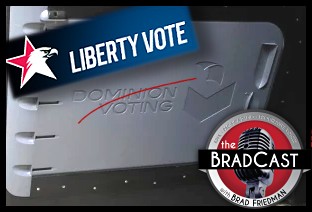 Trump-Allied GOP Partisan Buys Dominion Voting Systems: 'BradCast' 10/22/25
Trump-Allied GOP Partisan Buys Dominion Voting Systems: 'BradCast' 10/22/25 Trump, Republican Law(lessness) & (Dis)Order: 'BradCast' 10/21/25
Trump, Republican Law(lessness) & (Dis)Order: 'BradCast' 10/21/25 'Green News Report' 10/21/25
'Green News Report' 10/21/25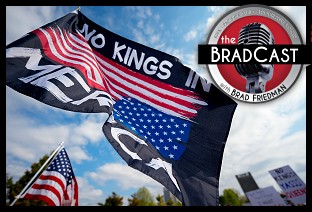 Celebrating 'No Kings': 'BradCast' 10/20/25
Celebrating 'No Kings': 'BradCast' 10/20/25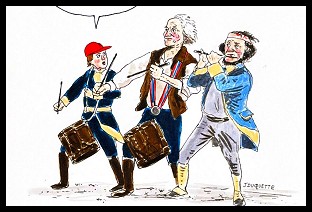 Sunday 'How It Started' Toons
Sunday 'How It Started' Toons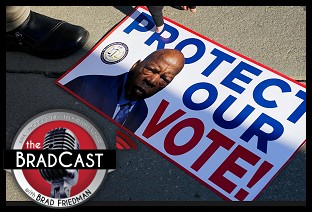 SCOTUS Repubs Appear Ready to Gut Rest of Voting Rights Act: 'BradCast' 10/16/25
SCOTUS Repubs Appear Ready to Gut Rest of Voting Rights Act: 'BradCast' 10/16/25 'Green News Report' 10/16/25
'Green News Report' 10/16/25 The 'Epstein Shutdown' and Other Autocratic Nightmares: 'BradCast' 10/15/25
The 'Epstein Shutdown' and Other Autocratic Nightmares: 'BradCast' 10/15/25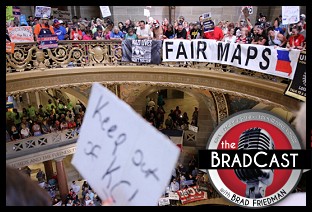 Group Vows to Block MO's GOP U.S. House Gerrymander: 'BradCast' 10/14/25
Group Vows to Block MO's GOP U.S. House Gerrymander: 'BradCast' 10/14/25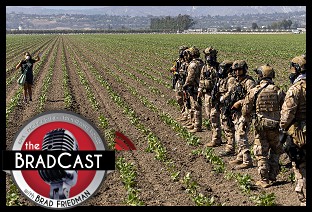 Trump Labor Dept. Warns Trump Policies Sparking Food Crisis: 'BradCast' 10/9/25
Trump Labor Dept. Warns Trump Policies Sparking Food Crisis: 'BradCast' 10/9/25 Trump's Losing Battles: 'BradCast' 10/8/25
Trump's Losing Battles: 'BradCast' 10/8/25 Trump, Roberts and His Stacked, Packed and Captured SCOTUS: 'BradCast' 10/7/25
Trump, Roberts and His Stacked, Packed and Captured SCOTUS: 'BradCast' 10/7/25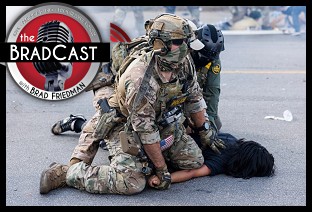 Trump Attempting His 'Invasion from Within': 'BradCast' 10/6/25
Trump Attempting His 'Invasion from Within': 'BradCast' 10/6/25 Biden Budget Expert: Mass Firings in Shutdown 'Illegal': 'BradCast' 10/2/25
Biden Budget Expert: Mass Firings in Shutdown 'Illegal': 'BradCast' 10/2/25 Why is DOJ Suing 'Blue' States for Their Voter Databases?: 'BradCast' 10/1/25
Why is DOJ Suing 'Blue' States for Their Voter Databases?: 'BradCast' 10/1/25
 VA GOP VOTER REG FRAUDSTER OFF HOOK
VA GOP VOTER REG FRAUDSTER OFF HOOK Criminal GOP Voter Registration Fraud Probe Expanding in VA
Criminal GOP Voter Registration Fraud Probe Expanding in VA DOJ PROBE SOUGHT AFTER VA ARREST
DOJ PROBE SOUGHT AFTER VA ARREST Arrest in VA: GOP Voter Reg Scandal Widens
Arrest in VA: GOP Voter Reg Scandal Widens ALL TOGETHER: ROVE, SPROUL, KOCHS, RNC
ALL TOGETHER: ROVE, SPROUL, KOCHS, RNC LATimes: RNC's 'Fired' Sproul Working for Repubs in 'as Many as 30 States'
LATimes: RNC's 'Fired' Sproul Working for Repubs in 'as Many as 30 States' 'Fired' Sproul Group 'Cloned', Still Working for Republicans in At Least 10 States
'Fired' Sproul Group 'Cloned', Still Working for Republicans in At Least 10 States FINALLY: FOX ON GOP REG FRAUD SCANDAL
FINALLY: FOX ON GOP REG FRAUD SCANDAL COLORADO FOLLOWS FLORIDA WITH GOP CRIMINAL INVESTIGATION
COLORADO FOLLOWS FLORIDA WITH GOP CRIMINAL INVESTIGATION CRIMINAL PROBE LAUNCHED INTO GOP VOTER REGISTRATION FRAUD SCANDAL IN FL
CRIMINAL PROBE LAUNCHED INTO GOP VOTER REGISTRATION FRAUD SCANDAL IN FL Brad Breaks PA Photo ID & GOP Registration Fraud Scandal News on Hartmann TV
Brad Breaks PA Photo ID & GOP Registration Fraud Scandal News on Hartmann TV  CAUGHT ON TAPE: COORDINATED NATIONWIDE GOP VOTER REG SCAM
CAUGHT ON TAPE: COORDINATED NATIONWIDE GOP VOTER REG SCAM CRIMINAL ELECTION FRAUD COMPLAINT FILED AGAINST GOP 'FRAUD' FIRM
CRIMINAL ELECTION FRAUD COMPLAINT FILED AGAINST GOP 'FRAUD' FIRM RICK SCOTT GETS ROLLED IN GOP REGISTRATION FRAUD SCANDAL
RICK SCOTT GETS ROLLED IN GOP REGISTRATION FRAUD SCANDAL VIDEO: Brad Breaks GOP Reg Fraud Scandal on Hartmann TV
VIDEO: Brad Breaks GOP Reg Fraud Scandal on Hartmann TV RNC FIRES NATIONAL VOTER REGISTRATION FIRM FOR FRAUD
RNC FIRES NATIONAL VOTER REGISTRATION FIRM FOR FRAUD EXCLUSIVE: Intvw w/ FL Official Who First Discovered GOP Reg Fraud
EXCLUSIVE: Intvw w/ FL Official Who First Discovered GOP Reg Fraud GOP REGISTRATION FRAUD FOUND IN FL
GOP REGISTRATION FRAUD FOUND IN FL

































